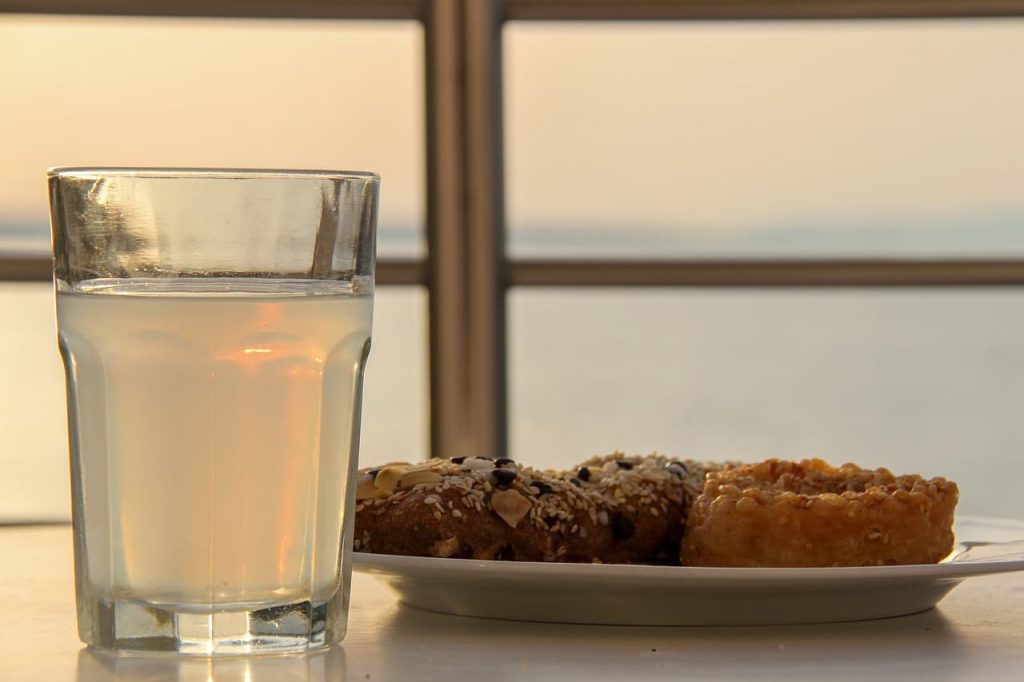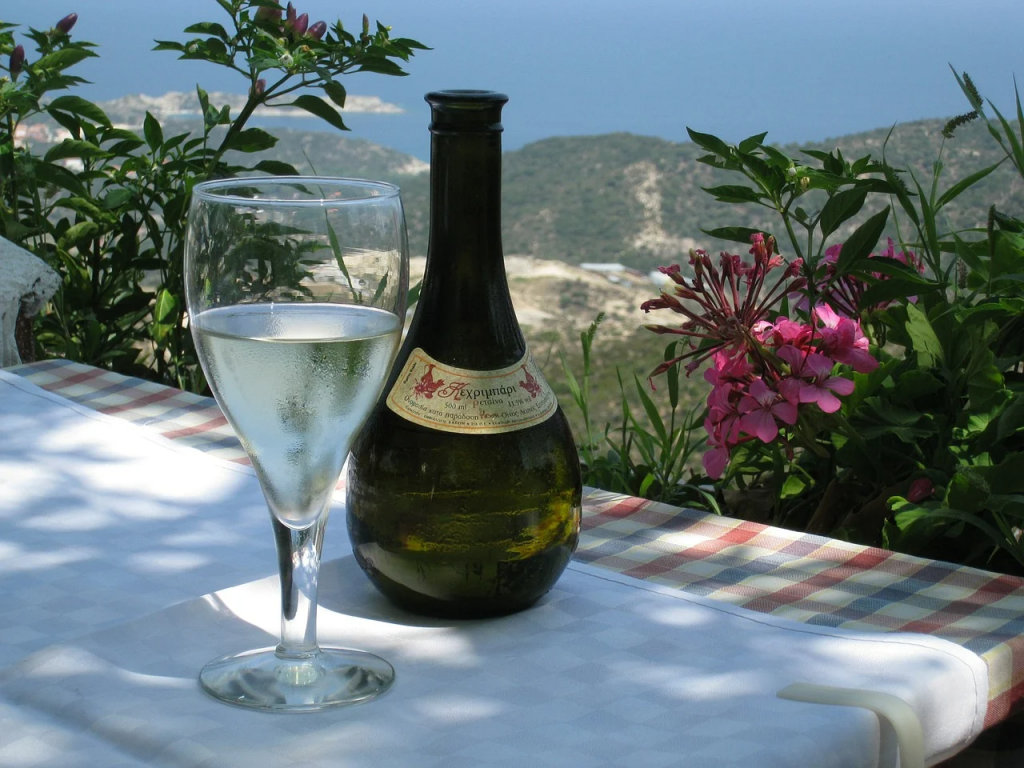Greece is a place where you can find rich culture, beautiful nature, and a diverse range of drinks. From wines to liqueurs, Greece offers diversity in traditional drinks as well.
If you wonder “What do Greeks drink?”, you’ll find the answer in the guide about Greek drinks below.
Traditional Drinks in Greece
Ouzo is the first Greek national drink that comes to mind when you ask about a traditional Greek drink. Since the time it was made in Thessaly in 1856, ouzo has been consumed by many people.
It’s a distilled drink made with anethol oil in anise, anise oil, fennel seeds, and some other local herbs. It’s a grain or grape-based drink. Greek alcohol ouzo is especially popular in summer. You dilute the aperitif ouzo smell by adding water and ice to ouzo liquor, making its color turn white. People usually accompany ouzo alcohol with Greek mezes such as sardines or grilled octopus. Ouzo alcohol percentage is 37.5 percent.
You can find hundreds of brands that sell ouzo in Greece.

Tsipouro
Tsipouro is another Greek alcohol that is very similar to tsikoudia and raki. Their difference from ouzo is their being grape distillates. It’s believed that tsipouro was first begun to be consumed in the 14th century in Mount Athos. Then, it spread to Macedonia and other parts of Greece after that period. The alcohol percentage is higher than that of ouzo, being around 40-45 percent. Tsipouro is also accompanied by mezes, however, it’s drunk straight.
There are tsipouros made with and without anise. You usually wait for tsipouro in the freezer before consuming it.
Raki vs Tsipouro
There are some differences between tsipouro and raki although some people confuse them with each other. Both Greek spirits are made from grapes. Raki comes from Crete while tsipouro is from mainland Greece. In addition, the alcohol percentage and inclusion of aniseed are other differences between these two popular drinks in Greece.
Tsikoudia
Tsikoudia is another Greek drink that Cretans and locals call raki. In mainland Greece, it’s also called tsipouro. Tsikoudia is distilled from grape pomace. The grapes are obtained from the leftovers used for winemaking. For this reason, you’ll find that many wineries in Greece also produce tsikoudia. Usually, people in Greece drink tsikoudia with ice or from the freezer. Some restaurants also serve tsikoudia as a complimentary Greek aperitif served with fruits. So, if you wonder what to drink with Greek food, tsikoudia can be a good alternative.
Metaxa
Metaxa is another famous Greek drink that is produced only in Greece. Its name comes from Spyros Metaxas who, in a way, created this drink in 1888. Metaxa is made with a combination of wine distillates and Mediterranean botanicals in oak barrels.
Greeks usually drink it straight or with one ice cube. You can know the quality of Metaxa through the number of stars that corresponds to the number of years it’s aged. There are five, seven, or 12 stars labeled on Metaxa bottles. Greek cocktails made with Metaxa include Greek tycoon, coffee royale, and harbor light.

Tentura of Patras
Tentura is a Greek liquor that originated in the city of Patra, in the east of Peloponnese. It dates back to the 15th century. It’s named after the Italian word “tincture”. It’s usually served in small shot glasses on the rocks. You can also add tentura to cocktails or coffee.
The ingredients include cinnamon, cloves, alcohol, nutmeg, citrus fruits, and sugar. The base alcohol inside this drink is usually brandy or rum. People usually serve tentura as a Greek after-dinner drink because of its digestive quality.
Kitron
Kitron is another type of Greece liquor. The original place of production of kitron is the Greek island of Naxos. The base of kitron’s taste is the leaves of the citron tree. Producers of this Greek drink collect the leaves and soak them in alcohol and water. Then, they distill it a few times to get Kitron distillate. Sugar and water are added after this step.
Mastiha
What is the oldest alcoholic beverage in Greece? Apparently, mastiha, or masticha, was started to be produced 2,500 years ago. It’s made from the resin of mastic trees on Chios island. The hardening drops of resin are called the tears of Chios. The drink is produced in a very limited area suitable for production. It is in the south of the island.
People usually drink Mastiha liquor on the rocks or as an aperitif. Some mixologists also produce several cocktails with Mastiha. You can find such cocktails, especially in Athens. It would help if you stored the drink in the freezer.

Popular Greek Wines
Wine is also an important element of Greek alcoholic drinks. Two special Greek wines are especially popular in Greece: Retsina wine and Vinsanto wine.
Retsina Wine
Retsina is a wine combined with Aleppo pine resin. You can best try retsina wine in a taverna. In Athens, bars also serve wine with soda, making it more affordable.
Vinsanto Wine
The name Vinsanto comes from Vin di Santorini (wine of Santorini). It’s made with sun-dried grapes. It’s endemic to this island, and its cultivation dates back to the 12th century. You can best consume this wine with fruits and desserts. It has an amber color.
Vinsanto wine was even granted a Gold Medal in the Challenge International du Vin 2019 in France. In Santorini, wineries provide educational tours and wine-tasting sessions for visitors as well.
Greek Beers
Finally, the beers… In Greece and on its many islands, you’ll find over 70 different types of beers. Many microbreweries have even won international awards. These include Nissos on Tinos and Septem on Evia. The popular Greek beer labels are Fix and Mythos, Fix being the first to be produced in 1864. Heineken and Carlsberg buy out both beers.
Some popular breweries in Greece include Zeos, Santorini Donkey, Corfu Red, Lesvos Sigri, and Varia.
Greek Non-Alcoholic Beverages
There are many non-alcoholic Greek drinks that are popular and refreshing, especially during the hot summer months. Some options include:
- Lemonade: Lemonade, or “spinos,” is a popular non-alcoholic drink in Greece that is made with fresh lemons, water, and sugar. It is often served over ice and garnished with a slice of lemon.
- Frappé: Frappé is a cold, frothy coffee drink that is made with instant coffee, water, and sugar. It is typically served over ice and can be enjoyed with or without milk or cream.
- Iced tea: Iced tea is a refreshing drink that is enjoyed in Greece, especially during the hot summer months. There are many different types of iced tea available, including black tea, green tea, and herbal tea.
- Fruit juices: Greece is home to many types of delicious, ripe fruits, and fruit juices made from these fruits are a popular non-alcoholic option. Some popular types of Greek fruit juices include orange, pomegranate, and sour cherry.
- Soft drinks: Soft drinks, such as cola, lemon-lime soda, and ginger ale, are also popular non-alcoholic options in Greece. They are often served over ice and can be enjoyed on their own or mixed with other ingredients to create a refreshing cocktail.
- Greek yogurt drinks: Greek yogurt drinks, such as “dough,” are a refreshing and healthy non-alcoholic option. They are made by blending Greek yogurt with water, ice, and fruit or sweeteners, and are often enjoyed as a breakfast or snack.
So, drinking in Greece is fun, and you’ll learn about many types of drinks in this way.
FAQ
What are some popular Greek drinks?
Some popular Greek drinks include ouzo, raki, and tsipouro. Ouzo is a clear, anise-flavored liquor that is typically served as an aperitif before a meal. Raki is a strong, clear liquor made from grapes or other fruit and is often enjoyed after a meal as a digestive. Tsipouro is a clear, grape-based spirit that is similar to raki and is often served in tavernas.
Is there a traditional way to serve Greek drinks?
Yes, Greek drinks are typically served in small glasses or cups, often accompanied by small plates of meze, or appetizers. Ouzo is typically served with ice and a splash of water, which turns the drink a milky color. Raki and tsipouro are often served neat or with a splash of cold water.
Can Greek drinks be mixed into cocktails?
Yes, Greek drinks can be mixed into cocktails. Ouzo can be mixed with lemonade or cola to create a refreshing summer drink, while raki and tsipouro can be used in cocktails like a martini or a sour.
Are there any non-alcoholic Greek drinks that are popular?
Yes, there are several popular non-alcoholic Greek drinks. Frappé is a popular iced coffee made with instant coffee, cold water, and sugar, and is often served with ice and milk. Greek iced tea, or gála, is a refreshing blend of black tea, lemon, and mint, and is often served with ice. Lemonade, or limonáda, is also a popular non-alcoholic drink in Greece, made with freshly squeezed lemon juice, sugar, and water.
Can Greek drinks be found outside of Greece?
Yes, Greek drinks can be found outside of Greece in many countries around the world. Ouzo, raki, and tsipouro can be found at specialty liquor stores or imported food markets, while non-alcoholic Greek drinks like frappé and gála can often be found at Greek restaurants or cafes.
Is ouzo a type of liquor?
Yes, ouzo is a type of liquor that is popular in Greece and the eastern Mediterranean. It is made from anise, a plant with a licorice-like flavor, and is usually enjoyed as an aperitif before a meal. Ouzo is often served with ice and mixed with water, which turns it a milky white color.
Is retsina a sweet wine?
Retsina is a white wine that is made in Greece and is known for its distinct flavor, which is imparted by the addition of resin to the wine. Retsina can range in sweetness, with some versions being quite dry and others being somewhat sweet. It is often served as an aperitif or with light, grilled dishes.
How do you make a frappé?
To make a frappé, you will need instant coffee, water, and sugar. Here is a simple recipe:
Ingredients:
- 1 tsp instant coffee
- 1 tbsp sugar
- 1 cup cold water
Instructions:
- In a blender or with a hand mixer, combine the instant coffee, sugar, and a small amount of cold water. Mix until the coffee and sugar are fully dissolved.
- Add the rest of the water and blend or mix until the mixture is frothy.
- Pour the frappé into a tall glass and serve over ice. You can also add milk or cream if desired.
How is Greek coffee different from regular coffee?
Greek coffee is made by boiling finely ground coffee beans with water and sugar, which results in a strong, flavorful cup of coffee. It is typically served in a small, narrow-rimmed cup called a “finchen” and is usually enjoyed black, without milk or cream. Greek coffee is made using a small, shallow pot called a “briki,” which is placed on a stovetop burner or over an open flame to heat the coffee.
Is tsipouro a type of brandy?
Tsipouro is a type of strong, grape-based spirit that is popular in Greece and other parts of the eastern Mediterranean. It is similar to brandy in that it is made from fermented grapes, but the production process is slightly different. Tsipouro is typically made by distilling the pressed grapes and their must, or juice, together, while brandy is made by distilling wine. Tsipouro is often enjoyed as an aperitif or after a meal as a digestive.
Are Greek juices made from fresh fruits?
Yes, many Greek juices are made from fresh, ripe fruits that are grown in Greece. Some popular types of Greek juices include orange, pomegranate, and sour cherry. These juices are often made by pressing and straining the fruit to extract the juice, and they may be sweetened with sugar or honey. Greek juices are typically enjoyed chilled and are a refreshing, healthy option for a hot day.
What are some good pairings for Greek drinks?
Greek drinks can be paired with a variety of foods, depending on the drink and the occasion. Ouzo is often enjoyed with meze, a selection of small, savory dishes that are served as appetizers. Retsina is typically paired with light, grilled dishes, such as fish or chicken. Frappé is often enjoyed as a refreshment on its own or with a sweet treat, such as a pastry. Greek coffee is usually served after a meal as a digestive, along with a sweet dessert.




